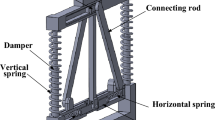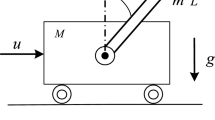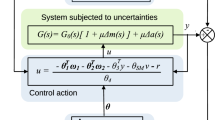Abstract
In this study, dissipative filtering of Markovian jumping systems (MJSs) is investigated using the sliding mode control (SMC) method. A novel dynamic model considering linearity and nonlinearity was proposed, and an adaptive sliding motion controller was established to study the dissipation and mean-square exponential stability. First, MJSs with time-varying delays are proposed, which involve known and unknown nonlinear functions. Subsequently, a novel sliding mode surface (SMS) function was constructed to ensure that the trajectory of the sliding motion dynamics could move along the SMS. In addition, an appropriate SMC rule was presented to guarantee SMS accessibility. Second, the filter was obtained through dissipation theory, which ensures that the filtering error system is extended-dissipative and the mean-square is exponentially stable. Finally, the effectiveness of this method was verified using a practical example.










Similar content being viewed by others
Data Availability
Data sharing is not applicable to this article as no data sets were generated or analysed during the current study.
References
L. An, G.H. Yang, Distributed optimal coordination for heterogeneous linear multiagent systems. IEEE Trans. Autom. Control 67(12), 6850–6857 (2021)
S. Boyd, L. El Ghaoui, E. Feron, V. Balakrishnan, Linear matrix inequalities in system and control theory (SIAM, Philadelphia, 1994)
L. Cao, Y. Pan, H. Liang, T. Huang, Observer-based dynamic event-triggered control for multiagent systems with time-varying delay. IEEE Trans. Cybern. 53(5), 3376–3387 (2022)
K. Ding, Q. Zhu, Extended dissipative anti-disturbance control for delayed switched singular semi-Markovian jump systems with multi-disturbance via disturbance observer. Automatica 128, 109556 (2021)
Y. Han, S. Zhou, Extended dissipative filtering for Markovian jump interval-valued fuzzy systems with uncertain transition rates. Fuzzy Sets Syst. 416, 86–107 (2021)
Y. Han, S. Zhou, Line integral approach to extended dissipative filtering for interval type-2 fuzzy systems. IEEE Trans. Cybern. 52(5), 3757–3768 (2022)
D.W. Ho, Y. Niu, Robust fuzzy design for nonlinear uncertain stochastic systems via sliding-mode control. IEEE Trans. Fuzzy Syst. 15(3), 350–358 (2007)
B. Jiang, H.R. Karimi, Y. Kao, C. Gao, A novel robust fuzzy integral sliding mode control for nonlinear semi-Markovian jump T-S fuzzy systems. IEEE Trans. Fuzzy Syst. 26(6), 3594–3604 (2018)
B. Jiang, H.R. Karimi, S. Yang, C. Gao, Y. Kao, Observer-based adaptive sliding mode control for nonlinear stochastic Markov jump systems via T-S fuzzy modeling: applications to robot arm model. IEEE Trans. Ind. Electron. 68(1), 466–477 (2020)
N. Krasovskii, E. Lidskii, Analytical design of controllers in systems with random attributes. Autom. Remote. Control. 22(1–3), 1021–1025 (1961)
H. Li, P. Shi, D. Yao, L. Wu, Observer-based adaptive sliding mode control for nonlinear Markovian jump systems. Automatica 64, 133–142 (2016)
Y. Li, Y. Zhao, W. Liu, J. Hu, Adaptive fuzzy predefined-time control for third-order heterogeneous vehicular platoon systems with dead-zone. IEEE Trans. Industr. Inf. 19(9), 9525–9534 (2023)
H. Liang, L. Chen, Y. Pan, H.K. Lam, Fuzzy-based robust precision consensus tracking for uncertain networked systems with cooperative-antagonistic interactions. IEEE Trans. Fuzzy Syst. 31(4), 1362–1376 (2022)
G. Liu, S. Xu, J.H. Park, G. Zhuang, Reliable exponential filtering for singular Markovian jump systems with time-varying delays and sensor failures. Int. J. Robust Nonlinear Control 28(14), 4230–4245 (2018)
D. Lu, D. Tong, Q. Chen, W. Zhou, J. Zhou, S. Shen, Exponential synchronization of stochastic neural networks with time-varying delays and lévy noises via event-triggered control. Neural Process. Lett. 53, 2175–2196 (2021)
R. Lu, J. Tao, P. Shi, H. Su, Z.G. Wu, Y. Xu, Dissipativity-based resilient filtering of periodic Markovian jump neural networks with quantized measurements. IEEE Trans. Neural Netw. Learn. Syst. 29(5), 1888–1899 (2017)
M. Sathishkumar, R. Sakthivel, O. Kwon, B. Kaviarasan, Finite-time mixed \({H}_{\infty }\) and passive filtering for Takagi–Sugeno fuzzy nonhomogeneous Markovian jump systems. Int. J. Syst. Sci. 48(7), 1416–1427 (2017)
S. Sun, H. Zhang, J. Han, J. Zhang, Dissipativity-based finite-time filtering for uncertain semi-Markovian jump random systems with multiple time delays and state constraints. IEEE Trans. Neural Netw. Learn. Syst. 33(7), 2995–3009 (2021)
Y. Tian, Z. Wang, A new integral inequality approach for extended dissipative filters design of singular Markovian jump systems with discrete and distributed delays. Circuits Syst. Sig. Process 39, 2900–2921 (2020)
Y. Tian, Z. Wang, Asynchronous extended dissipative filtering for T-S fuzzy Markov jump systems. IEEE Trans. Syst. Man Cybern. Syst. 52(6), 3915–3925 (2022)
D. Tong, X. Liu, Q. Chen, W. Zhou, K. Liao, Observer-based adaptive finite-time prescribed performance NN control for nonstrict-feedback nonlinear systems. Neural Comput. Appl. 34(15), 12789–12805 (2022)
D. Tong, B. Ma, Q. Chen, Y. Wei, P. Shi, Finite-time synchronization and energy consumption prediction for multilayer fractional-order networks. IEEE Trans. Circuits Syst. Express Briefs 70(6), 2176–2180 (2023)
D. Tong, C. Xu, Q. Chen, W. Zhou, Y. Xu, Sliding mode control for nonlinear stochastic systems with Markovian jumping parameters and mode-dependent time-varying delays. Nonlinear Dyn. 100(2), 1343–1358 (2020)
J.C. Willems, Dissipative dynamical systems part I: general theory. Arch. Ration. Mech. Anal. 45(5), 321–351 (1972)
C. Xu, D. Tong, Q. Chen, W. Zhou, P. Shi, Exponential stability of Markovian jumping systems via adaptive sliding mode control. IEEE Trans. Syst. Man Cybern. Syst. 51(2), 954–964 (2021)
Y. Xu, Z.G. Wu, Y.J. Pan, Event-based dissipative filtering of Markovian jump neural networks subject to incomplete measurements and stochastic cyber-attacks. IEEE Trans. Cybern. 51(3), 1370–1379 (2019)
G. Yang, D. Tong, Q. Chen, W. Zhou, Fixed-time synchronization and energy consumption for Kuramoto-oscillator networks with multilayer distributed control. IEEE Trans. Circuits Syst. Express Briefs 70(4), 1555–1559 (2023)
J. Yang, W. Zhou, P. Shi, X. Yang, X. Zhou, H. Su, Adaptive synchronization of delayed Markovian switching neural networks with Lévy noise. Neurocomputing 156, 231–238 (2015)
J. Yang, W. Zhou, P. Shi, X. Yang, X. Zhou, H. Su, Synchronization of delayed neural networks with Lévy noise and Markovian switching via sampled data. Nonlinear Dyn. 81(3), 1179–1189 (2015)
B. Zhang, W.X. Zheng, S. Xu, Filtering of Markovian jump delay systems based on a new performance index. IEEE Trans. Circuits Syst. Regul. Pap. 60(5), 1250–1263 (2013)
G. Zhang, D. Tong, Q. Chen, W. Zhou, Sliding mode control against false data injection attacks in dc microgrid systems. IEEE Syst. J. (2023). https://doi.org/10.1109/JSYST.2023.3280185
J. Zhang, X. Liu, Y. Xia, Z. Zuo, Y. Wang, Disturbance observer-based integral sliding-mode control for systems with mismatched disturbances. IEEE Trans. Ind. Electron. 63(11), 7040–7048 (2016)
L. Zhang, C. Deng, W.W. Che, L. An, Adaptive backstepping control for nonlinear interconnected systems with prespecified-performance-driven output triggering. Automatica 154, 111063 (2023)
L. Zhang, Y. Sun, Y. Pan, D. Hou, S. Wang, Network-based robust event-triggered control for continuous-time uncertain semi-Markov jump systems. Int. J. Robust Nonlinear Control 31(1), 306–323 (2021)
L. Zhang, Y. Sun, Y. Pan, H.K. Lam, Reduced-order fault detection filter design for fuzzy semi-Markov jump systems with partly unknown transition rates. IEEE Trans. Syst. Man, Cybern. Syst. 52(12), 7702–7713 (2022)
Q. Zhang, J. Zhang, Y. Wang, Sliding-mode control for singular Markovian jump systems with Brownian motion based on stochastic sliding mode surface. IEEE Trans. Syst. Man Cybern. Syst. 49(3), 494–505 (2017)
Y. Zhang, C. Ding, J. Wang, J. Cao, High-energy orbit sliding mode control for nonlinear energy harvesting. Nonlinear Dyn. 105(1), 191–211 (2021)
J. Zhao, D.J. Hill, Dissipativity theory for switched systems. IEEE Trans. Autom. Control 53(4), 941–953 (2008)
Acknowledgements
This work is partially supported by the Guangxi Natural Science Foundation under Grant No. 2023GXNSFAA026104, Zhejiang Provincial Natural Science Foundation of China under Grant LZ22F020002, and Huzhou Science and Technology Planning Foundation under Grant No. 2023GZ04.
Author information
Authors and Affiliations
Corresponding authors
Ethics declarations
Conflict of interest
The authors declare that they have no conflict of interest.
Additional information
Publisher's Note
Springer Nature remains neutral with regard to jurisdictional claims in published maps and institutional affiliations.
Rights and permissions
Springer Nature or its licensor (e.g. a society or other partner) holds exclusive rights to this article under a publishing agreement with the author(s) or other rightsholder(s); author self-archiving of the accepted manuscript version of this article is solely governed by the terms of such publishing agreement and applicable law.
About this article
Cite this article
Zhai, G., Chen, Q., Tong, D. et al. Dissipative Filtering of Markovian Jumping Systems via Adaptive Sliding Mode Control. Circuits Syst Signal Process 43, 865–894 (2024). https://doi.org/10.1007/s00034-023-02520-1
Received:
Revised:
Accepted:
Published:
Issue Date:
DOI: https://doi.org/10.1007/s00034-023-02520-1




